Chinese Academy of Sciences launches Key Laboratory of Photobiology
The key laboratory will be devoted to the key issues of the solar energy bio-transformation and its application to agriculture and energy.
Feb 10th, 2010
Read more
The key laboratory will be devoted to the key issues of the solar energy bio-transformation and its application to agriculture and energy.
Feb 10th, 2010
Read more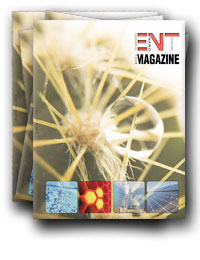 ENT Magazine is an international magazine covering the latest research, applications, and opinions in the field of nanotechnology for the environment - alternative energies, water, air and soil purification.
ENT Magazine is an international magazine covering the latest research, applications, and opinions in the field of nanotechnology for the environment - alternative energies, water, air and soil purification.
Feb 10th, 2010
Read moreThe American Filtration and Separations Society (AFS) is offering Water Filtration and Liquid Separation Training on March 22nd in San Antonio, Texas, USA.
Feb 10th, 2010
Read more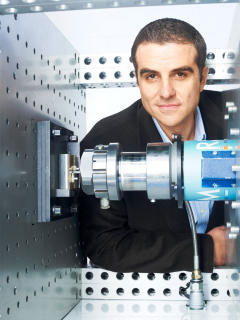 In January 2010, a new Helmholtz university junior research group was set up at the GKSS Research Centre in Geesthacht. The new group devotes itself to the interface properties of polymer-metal hybrid structures produced by advanced joining technologies.
In January 2010, a new Helmholtz university junior research group was set up at the GKSS Research Centre in Geesthacht. The new group devotes itself to the interface properties of polymer-metal hybrid structures produced by advanced joining technologies.
Feb 10th, 2010
Read moreTwo Purdue University researchers are among 69 chosen nationwide by the U.S. Department of Energy to receive awards through the DOE's new Early Career Research Program.
Feb 10th, 2010
Read more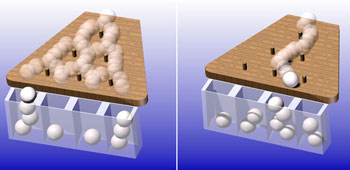 Licht eignet sich besonders gut, um die Zufallsbewegung eines Quantenteilchens in einem Experiment zu untersuchen.
Licht eignet sich besonders gut, um die Zufallsbewegung eines Quantenteilchens in einem Experiment zu untersuchen.
Feb 10th, 2010
Read moreA new, more efficient low-cost microring resonator for high speed telecommunications systems has been developed. This technological advance capitalizes on the benefits of optical fibers to transmit large quantities of data at ultra-fast speeds.
Feb 10th, 2010
Read more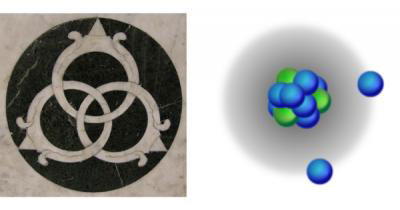 Heaviest halo nucleus discovered.
Heaviest halo nucleus discovered.
Feb 9th, 2010
Read more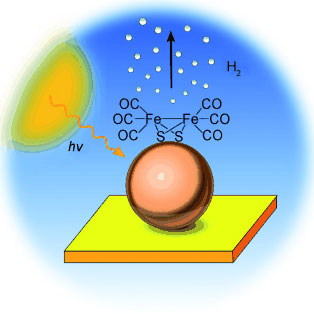 Hydrogen-powered fuel cells and solar energy are the best hope for a more environmentally friendly and resource-sparing energy supply in the future. Previous approaches to this have suffered from high costs and the limited lifetime of their catalytic systems. Researchers have now introduced an efficient, robust photoelectrode made of common, inexpensive materials.
Hydrogen-powered fuel cells and solar energy are the best hope for a more environmentally friendly and resource-sparing energy supply in the future. Previous approaches to this have suffered from high costs and the limited lifetime of their catalytic systems. Researchers have now introduced an efficient, robust photoelectrode made of common, inexpensive materials.
Feb 9th, 2010
Read moreResearchers at the California Institute of Technology (Caltech) have developed a way to make some notoriously brittle materials ductile - yet stronger than ever - simply by reducing their size.
Feb 9th, 2010
Read more Researchers trying to restore vision damaged by disease have found promise in a tiny implant that sows seeds of new cells in the eye. They built a mesh through a process called electrospinning, which uses electrical charges to draw biodegradable polymers out of a needle and into a fine stream, producing interwoven fibers ranging from 1/20th to 1/1000th the width of a hair.
Researchers trying to restore vision damaged by disease have found promise in a tiny implant that sows seeds of new cells in the eye. They built a mesh through a process called electrospinning, which uses electrical charges to draw biodegradable polymers out of a needle and into a fine stream, producing interwoven fibers ranging from 1/20th to 1/1000th the width of a hair.
Feb 9th, 2010
Read moreHouse representative David Wu has introduced the Nanotechnology Education Act (HR 4502 IH) with the goal of strengthening the capacity of eligible institutions in the U.S. to provide instruction in nanotechnology.
Feb 9th, 2010
Read moreSeit 1. Februar 2010 laeuft an der Europaeischen Akademie ein von der EU gefoerdertes Forschungsprojekt zum Einsatz nanotechnologischer Verfahren in der Arthrititis-Forschung und Therapie.
Feb 9th, 2010
Read more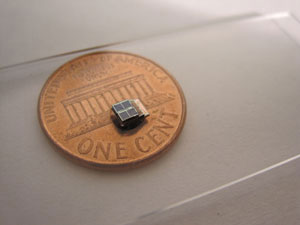 A 9-cubic millimeter solar-powered sensor system developed at the University of Michigan is the smallest that can harvest energy from its surroundings to operate nearly perpetually.
A 9-cubic millimeter solar-powered sensor system developed at the University of Michigan is the smallest that can harvest energy from its surroundings to operate nearly perpetually.
Feb 9th, 2010
Read moreStudy of vesicular stomatitis virus leads to model of viral assembly process.
Feb 9th, 2010
Read moreScientists at SINTEF/NTNU and the University of Oslo have been awarded NOK 25 million by the Research Council of Norway for investments in equipment for surface analysis.
Feb 9th, 2010
Read more